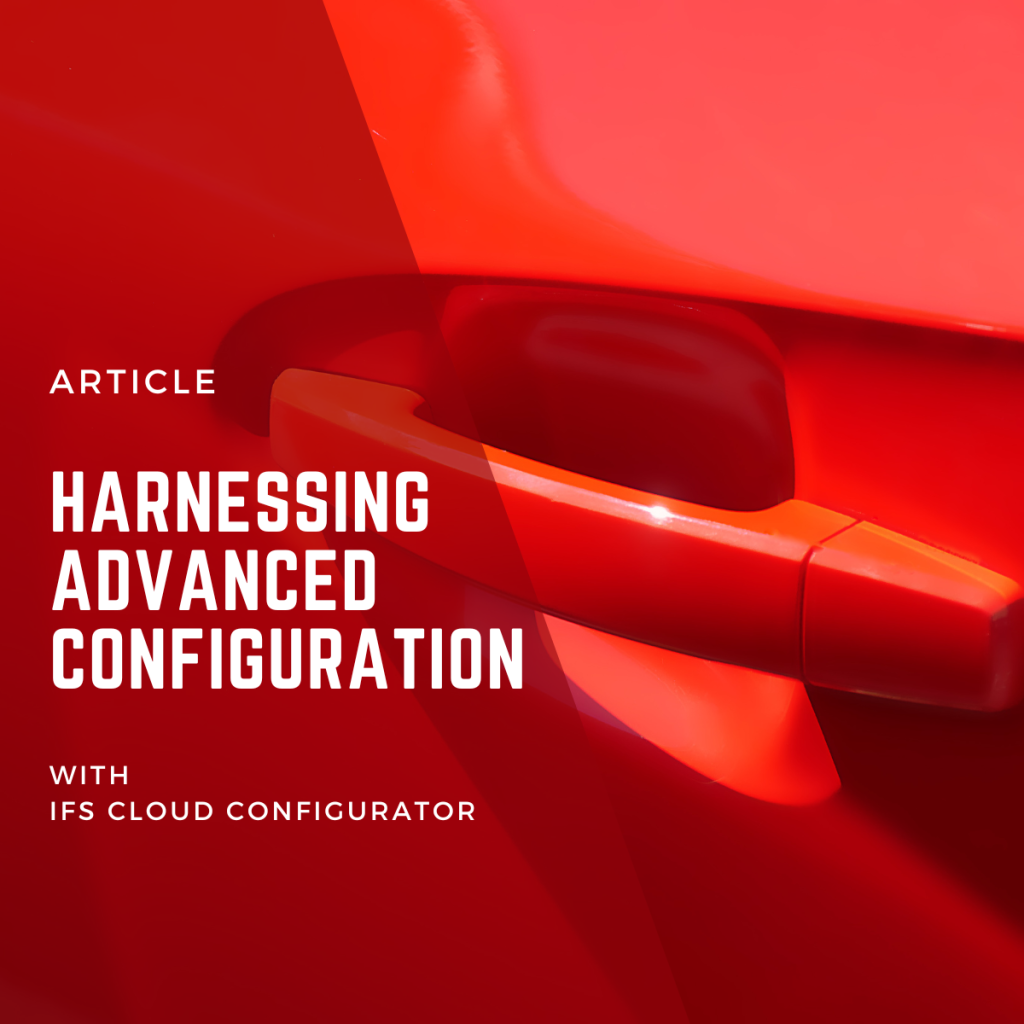In today’s competitive market, maintaining high standards of quality control is essential for any organization. The IFS Cloud Quality Control solution offers a comprehensive framework to ensure that products meet the highest quality standards. This solution is integrated seamlessly into the IFS Cloud platform, providing robust tools for managing and monitoring quality across all stages of production, procurement, and inventory management. As a full web application, IFS Cloud offers mobility and flexibility, enabling users to access and manage quality control processes from anywhere.
Integrated Quality Control Framework
IFS Cloud provides a fully integrated quality control system that covers various aspects of quality management, including control plans, statistical process control (SPC), failure modes and effects analysis (FMEA), and comprehensive data analysis. This integration ensures that quality management is not an isolated function but a core part of the overall operational process.
Control Plans
Control plans are central to the IFS Cloud Quality Control solution. They provide a structured approach to define, monitor, and manage quality control activities for different parts and processes. Control plans describe the methods for controlling parts and processes to minimize product and process variations. They are essential for ensuring that products meet customer requirements and comply with regulatory standards.
Key Features of Control Plans:
- Comprehensive Data Points: Control plans include data points for various types of measurements, such as variable, attribute, and categorical data. This ensures that all aspects of quality are monitored and controlled.
- Phase In and Phase Out Dates: Control plans can be set with phase in and phase out dates, ensuring that the correct version of the control plan is used at the right time.
- Checklist Integration: Control plans can include checklists to ensure all required steps are completed before a control plan is made active.
- Revision Control: Multiple revisions of control plans can be maintained, and only one revision can be active at a time. This allows for continuous improvement and updates to quality control procedures.
- Mobility and Accessibility: As part of the IFS Cloud, control plans can be accessed and managed from any location using any device, providing flexibility and ensuring that quality control activities can be performed on the go.
Statistical Process Control (SPC)
Statistical Process Control (SPC) is a method of quality control that uses statistical methods to monitor and control a process. IFS Cloud provides robust SPC tools that include control charts and alarm rules to ensure processes operate at their full potential.
Key Features of SPC:
- Control Charts: IFS Cloud supports various types of control charts, such as X-bar, R, XMR, NP, P, C, and U charts. These charts help in studying how a process changes over time and identifying any variations that need attention.
- Alarm Rules: Users can define alarm rules to trigger notifications when certain conditions are met, such as points falling outside control limits. This helps in taking immediate corrective actions.
- Integration with Analysis Results: SPC charts are generated using the analysis results from control plans, ensuring all quality control data is centralized and easily accessible.
- Real-time Monitoring: The web-based nature of IFS Cloud allows for real-time monitoring and control, providing up-to-date information on process performance and quality metrics.
Failure Modes and Effects Analysis (FMEA)
IFS Cloud includes FMEA functionality to help identify potential failure modes and their effects on processes and products. This proactive approach to quality management ensures that potential issues are identified and addressed before they become significant problems.
Key Features of FMEA:
- Design and Process Perspectives: FMEA can be conducted from both design and process perspectives, ensuring a comprehensive analysis of potential failure points.
- Integration with Control Plans: FMEA findings can be integrated into control plans, ensuring that identified risks are continuously monitored and controlled.
- Detailed Risk Assessment: IFS Cloud provides detailed risk assessment tools, allowing users to prioritize and address high-risk areas effectively.
Analysis and Results
IFS Cloud allows for detailed analysis and registration of quality inspection results. This feature supports multiple analyses for long-running production orders, production schedules, and purchase order receipts. The ability to register and track inspection results ensures that quality data is always up-to-date and actionable.
Key Features of Analysis and Results:
- Multiple Analyses Registration: Users can register multiple analyses for a single control plan, accommodating long-running production orders and multiple receipts against a purchase order line.
- Detailed Inspection Results: Results from inspections can be registered against specific control plan data points, providing detailed insights into quality performance.
- Historical Data Access: Historical analysis results can be accessed and reviewed, supporting continuous improvement efforts.
- Flexible Data Entry: The web-based interface of IFS Cloud allows for flexible data entry, enabling users to input inspection results from various devices and locations.
Practical Applications
Manufacturing: In manufacturing, control plans are used to ensure that every step of the production process is monitored for quality. From shop orders to production schedules, IFS Cloud ensures that quality control is integrated into the manufacturing workflow.
Procurement: For procurement, control plans ensure that incoming materials meet quality standards. Inspections can be performed upon receipt, and analysis results are tracked to maintain high-quality standards for purchased parts.
Inventory Management: In inventory management, control plans help maintain the quality of stored parts and materials. Regular inspections and analysis ensure that inventory items meet required specifications before they are used in production.
Business Benefits
The IFS Cloud Quality Control solution offers significant business benefits, including:
- Enhanced Efficiency: By integrating quality control into every aspect of operations, IFS Cloud reduces the time and effort required to manage quality processes.
- Improved Accuracy: Detailed data points and robust analysis tools ensure that quality measurements are precise and reliable.
- Increased Visibility: Comprehensive reporting and analysis provide clear insights into quality performance, supporting informed decision-making.
- Proactive Quality Management: Tools like SPC and FMEA help identify and address quality issues before they affect production, leading to higher product quality and customer satisfaction.
- Mobility and Flexibility: As a full web application, IFS Cloud offers the mobility to manage quality control processes from anywhere, ensuring that quality standards are maintained even in remote or field operations.
Conclusion
The IFS Cloud Quality Control solution is a powerful tool for managing quality across all aspects of production, procurement, and inventory management. Its integrated approach ensures that quality is a core part of the operational process, providing the tools and insights needed to maintain high standards and drive continuous improvement. With IFS Cloud, organizations can ensure that their products meet the highest quality standards, enhancing customer satisfaction and operational efficiency. The mobility and flexibility offered by IFS Cloud further empower users to manage quality control processes from any location, ensuring that quality is never compromised.
ABOUT THE AUTHOR
With over 20 years of professional expertise in the IT software industry, including an impressive 19-year tenure in a managerial position at IFS Turkey, Göksel Sanbay brings a wealth of experience to the table. Throughout his career, he has successfully managed dozens of hands-on ERP, EAM, and ESM projects, leaving a trail of satisfied clients and successful implementations.
Notably, he has also excelled as a solution architect, leaving his mark on various reference IFS projects. His passion for innovation and driving efficiency has led him to embark on a new journey. In July 2022, he founded GUMA Business Solutions, a dynamic consulting company exclusively dedicated to crafting cutting-edge business software solutions, with a specialization in IFS Applications.
At GUMA, we thrive on challenges and aspire to take businesses to new heights through tailor-made software solutions that streamline operations, boost productivity, and empower growth.








